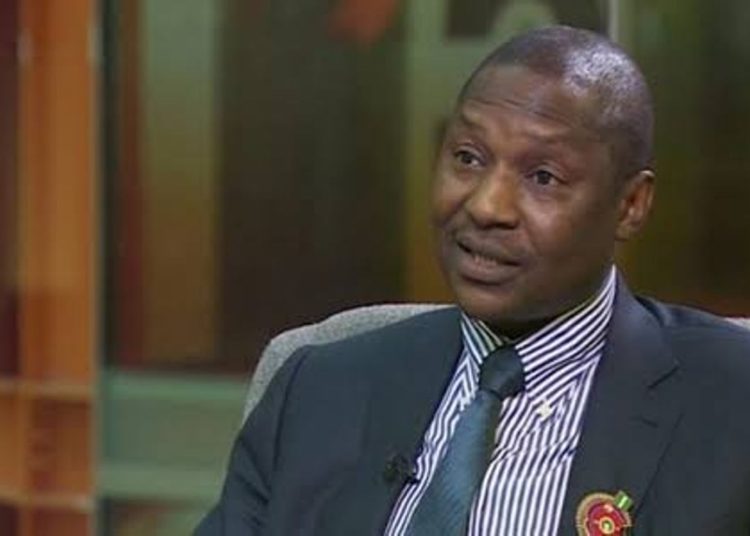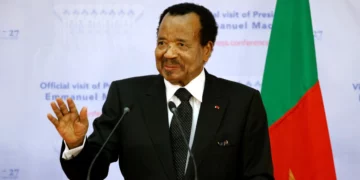Chairman of the Southern Governors’ Forum and Ondo State governor, Rotimi Akeredolu and the attorney-general of the federation and minister of justice, Abubakar Malami (SAN) yesterday openly disagreed on the need for Nigeria to be restructured and the decentralisation of the police.
While Akeredolu called for a compressive restructuring of the federation particularly devolution of power and the creation of state police in the wake of growing insecurity in the country, Malami said that governors lack the moral authority to demand restructuring, while usurping the powers of local government chairmen.
Both men spoke at the meeting of the Attorneys-General of the 36 States of Nigeria, which was held in Lagos.
Akeredolu, who delivered the keynote address at the meeting insisted that the police have failed in their constitutional role of protecting Nigerians and that if the situation does not improve citizens, would be left with no other option but to arm themselves in self-defence.
Addressing the AGF directly, he said, “We will carry arms very soon. Oga Malami. There is no other way.”
The governor, who had earlier called for a one-minute silence in honour of the 40 victims of the “Owo massacre”, maintained that the police as presently constituted are overwhelmed and that they should “close shop” if the federal government could not meet its equipment needs.
He argued that the mass killings, kidnappings and other serious security failures around the country had shown that a central police command was ineffective to keep Nigerians safe.
Akeredolu stated, “The current spate of insecurity in the country leaves us with no room for equivocation on the right of the states to maintain law and order through the establishment of State Police.
“The growing distrust in the polity is a direct result of the disconnect between the federal government and the constituent units of the country. The economic adversity, currently experienced in the country, points directly at the defective political structure.
“A unitary system cannot work, successfully, in a country like Nigeria.
“The 1999 Constitution has been amended twice. There is another promise of further amendments arising from the manifest irregularity in many provisions.
“This has compelled many lawyers and educated citizens to insist on having a new Constitution which will reflect the agitations of the various groups which make up the country. The law is becoming increasingly less certain under these circumstances.
“The crises created by the 1999 Constitution, as amended, have been unending. There have been agitations that the Exclusive Legislative List in this Constitution is limited to Nigeria’s external trade, customs duties, export duties, tax on incomes, profits and capital gains, interstate commerce, external borrowing, mining rents and royalties from mineral resources, among others.
“The Federal Government has, consistently, rejected this suggestion, presumably, because of the humongous 52% revenue allocation to it while the 36 States and the 774 Local Governments share the remaining 48%,” the governor stated.
Akeredolu further challenged states to restructure the country by, among others, setting up their anti-graft agencies.
But in his response, Malami said governors cannot continue agitation for restructuring and state police when they are responsible for the compromise and mismanagement of the current system.
The AGF claimed that state governors who have taken over the allocations of local government in their states have no moral right to ask for restructuring.
He pointed out that the Nigerian system is not working due to the attitudes of the citizens and until Nigerians allow the system to function the country will continue to have crises.
Malami also stated that “state police will not work because state governors would abuse it, look at the way they treat local government, imagine what will happen if they control the police.”
The AGF advised the governors to utilise the existing structures through the National Assembly to press on with their demands for restructuring and other constitutional amendments.
He said, “I wish to observe that recent developments, whereby the constituent states of the Federation have resorted to using the instrumentality of the law in advancing the interests of the States are a welcome development.
“This will benefit our nation in terms of the expansion of our jurisprudence and development of our practice of fiscal federalism.
“I must however caution that this developmental quest must be fought within the confines of relevant laws and with due regard to the underlying national philosophies of unity and harmony. We must always take into consideration the symbiotic relationship between the federal and state governments.
“Majority of the cases in question are based on monetary claims which probably requires more negotiations, adjustment of sharing formula or ratio, legislative amendments, etc.
“For example, in recognition of the rights or interests of the States in the forfeiture and recovery of assets, Section 70(b) of the Proceeds of Crime (Recovery and Management) Act 2022 has made provision for a State to be compensated, where it has suffered grave pecuniary loss in respect of the forfeited or confiscated asset. We need more of such initiatives and reforms in our legal process to address any perceived grievance of the Federating units.
“The present controversies surrounding the Paris/London Club loan refunds could have been avoided if NGF/State Governments and ALGON, who engaged the services of consultants and contractors honoured their agreements. NGF and ALGON have not denied engaging the consultants and contractors on behalf of their respective states and local governments,” he maintained.
Other speakers at the event are Governor Babajide Sanwo-Olu, the chief judge of Lagos State, Justice Kazeem Alogba, the state’s attorney-general, Moyosore Onigbanjo (SAN), and the president of the Nigerian Bar Association (NBA) Olumide Akpata and director-general of the Nigerian Governors Forum, Asishana Okauru.





